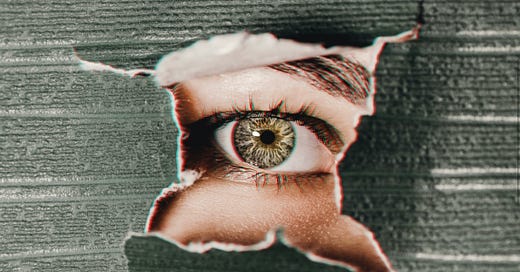This Newsletter is free for everyone. I send this email to you weekly. If you would also like to receive it, join the 10,000 other learners today.
Don’t want to read this article? Listen via podcast instead on Apple, Spotify, and YouTube.
I spent my entire life rarely making eye contact with anyone.
Fast forward now and I’ve spent the last 6 years making eye contact, being myself, and having great conversations with some of the world’s most successful people and strangers.
It’s surreal now to think about my past when I hardly have any memories of looking into people’s eyes, and now it’s a default behavior I’ve installed in my mind.
Many of you have sent emails and submitted questions around this topic of eye contact and social anxiety.
Should we make eye contact? Should we look at someone’s forehead instead?
Here’s the most surprising detail I uncovered...
The Eye Contact Paradox
We avoid eye contact so we don’t make things awkward. Social anxiety makes us think everything we do will be awkward even something normal like eye contact.
But here’s the thing. Believe it or not, the more you avoid looking at people’s eyes, the more you will naturally fear it. Which is counterintuitive to why you are avoiding eye contact in the first place.
The functional neurology center says: “Avoidance of eye contact is associated with shame, embarrassment, and self-consciousness, things people with heightened anxiety suffer from.”
Our brains are running off the unwritten rules of social interaction. Eye contact is a major piece of the puzzle you can’t necessarily ignore or wish it didn’t exist.
I get it, there’s a reason why you don’t make eye contact. It’s because if you’ve never trained or practiced, on top of social anxiety, it’s extremely mentally draining.
Research shows you’re able to speak more thoughtfully when looking away from a person. A Japanese study found participants struggled to find the right verbs for a language task when making eye contact with faces on a screen. The scientists asserted that eye contact drains our cognitive resources needed for other tasks — the more complicated your story (or lie?), the more difficult it will be for you to maintain eye contact.
Before we get into how do you make eye contact...
First, we must address...a key component.
Don’t Look at the Group, See the Individual
When you walk into a room, and people look at you, and use their eyes to see you, they are most likely not judging you. Rather, understand social anxiety creates this illusion of social judgement.
By seeing a huge group of people, it turns into a monster in your mind that you can’t possibly tackle and must run away from. Reverse this by seeing individual people.
It’s important to note, there’s no such thing as a group. A group is a collection of individuals, all who have a set of eyes, and a set of pains, anxieties, and motivations.
VeryWell Mind states: A 2017 review published in Current Psychiatry Reports found that social anxiety is related to a mixture of being on guard and avoiding processing emotional social stimuli. This means that at a party, you might both be on the lookout for people who seem to be judging you, but also try to avoid situations in which you feel you are being judged.
When you go somewhere, look at the people looking at you. Make eye contact with them. It may seem scary at first, but this results in lower social anxiety for the rest of the time.
How Do You Make Eye Contact?
Never made eye contact before with anyone? No problem. Start by making direct eye contact with yourself in the mirror for a couple minutes.
Start virtually, while it may be weird through a digital screen. Try to make direct eye contact with people virtually, in movies, and normalize it.
Next start with 1 person, it could be your mom, roommate, bestfriend begin to make eye contact with them, no matter how awkward it feels at first, the feeling will eventually dissipate.
Start making eye contact before the conversation even starts when you see someone first coming towards you.
When listening, make more eye contact, then when you are speaking. It’s much more natural to look away or around when speaking, but when listening try to do most of the eye contact.
Break down the group of people, into individuals. You can’t make eye contact with more than one person at once within a moment of time.
Slow things down. Most of the time anxiety makes think and move fast. Moving fast, like feeling antsy and overactive may make you feel more socially anxious. Exercising or meditating beforehand can greatly help slow things down to a point of more conscious control.
Have you checked out my podcast yet?
Listen to Apple, Spotify, and YouTube.
Can I help?
Over the last several years I’ve devoted my life to helping introverted, shy, socially anxious creators, entrepreneurs, CEOs, and professionals move these mental health obstacles out of their life so they can get busy being their real selves in front of anyone.
If you are interested in potentially inquiring about my services for yourself or someone else, please fill out this form below.
For the next steps, fill out this form - here
Found this helpful? Please share and tag me!
Have any Questions? Just reply directly to this email and I’ll respond :)




